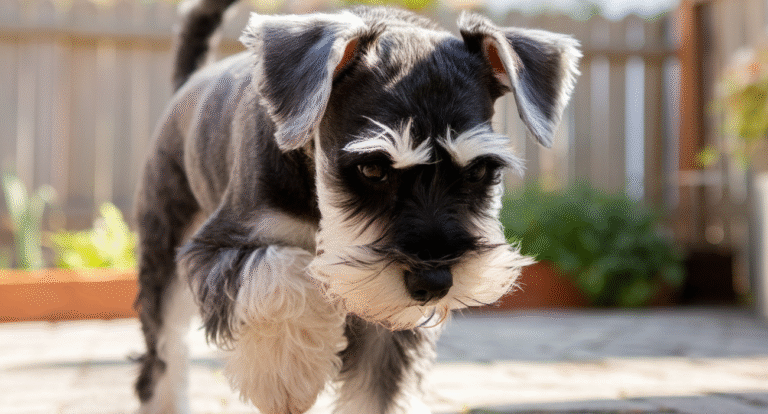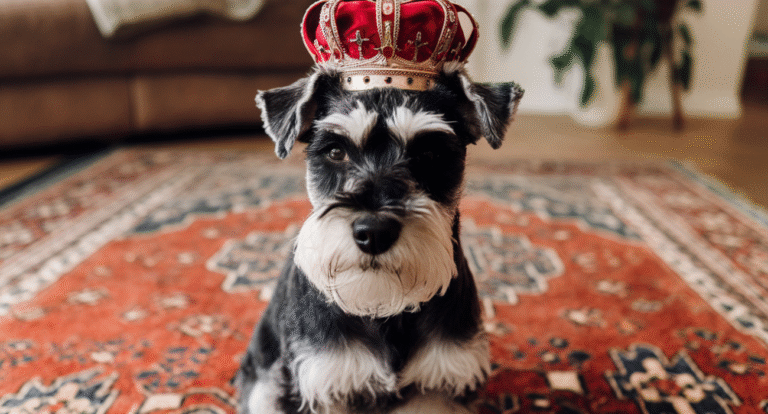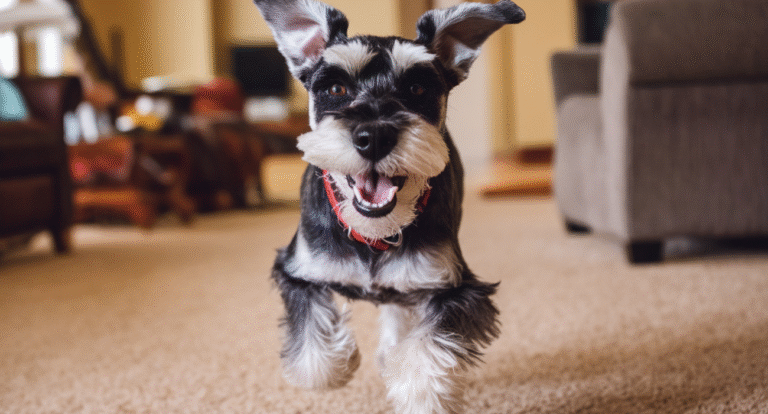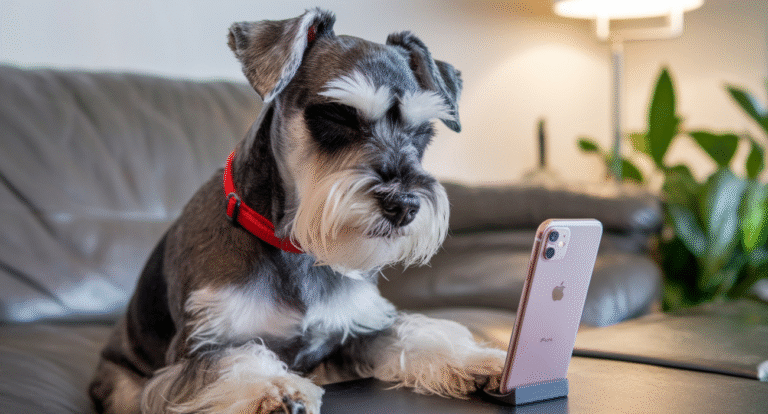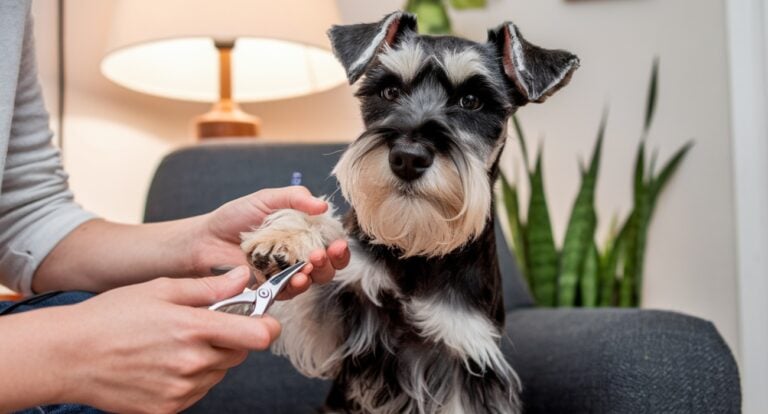Worried about aggression with other dogs? Find out what’s typical in Schnauzers and how to encourage harmonious playdates.
Here’s a confession from the dog world: Schnauzers have an attitude problem. Or do they? These compact, bearded bundles of energy definitely have opinions about other dogs, but calling them aggressive might be like calling a spirited debate partner “combative” just because they refuse to stay quiet.
The question isn’t really whether Schnauzers can be aggressive with other dogs. Any breed can display aggression under certain circumstances. The better question is whether Schnauzers are inherently more aggressive than other breeds, and what factors actually influence their behavior around fellow canines.
Getting to Know the Schnauzer Temperament
Schnauzers weren’t bred to be lap dogs or gentle companions for afternoon tea parties. These German working dogs originally served as ratters, guard dogs, and farm protectors. That heritage means they come equipped with alertness, courage, and territorial instincts hardwired into their DNA. When you understand their background, their sometimes bossy behavior around other dogs starts making a lot more sense.
The breed comes in three sizes (Miniature, Standard, and Giant), and each carries slightly different temperament traits. Miniature Schnauzers tend to have the spunkiest, most terrier-like personalities, while Standard and Giant Schnauzers typically display more serious guardian instincts. All three share that characteristic Schnauzer confidence, though, which can sometimes read as aggression to other dogs and their humans.
The Confidence Factor
Schnauzers possess what trainers often call “big dog energy” regardless of their actual size. They don’t seem to recognize that they might be outweighed by 80 pounds when facing down a Golden Retriever. This bold self-assurance isn’t aggression in itself, but it can trigger reactions from other dogs who interpret that confidence as a challenge or threat.
Your Schnauzer isn’t necessarily being aggressive when they posture and vocalize at other dogs. They’re often just being incredibly, almost comically, honest about their feelings and boundaries.
Territorial and Protective Instincts
One of the biggest factors in Schnauzer behavior around other dogs stems from their strong territorial nature. These dogs take property ownership seriously. Whether it’s your home, your car, or even that particular corner of the dog park you always visit, Schnauzers often decide certain spaces belong to them and their family.
This territorial behavior manifests differently depending on the situation. At home, a Schnauzer might bark intensely at dogs walking past the window or fence. In neutral territory, they might be perfectly friendly with the same dog. The location matters enormously to how a Schnauzer perceives potential canine interactions.
| Setting | Typical Schnauzer Behavior | Aggression Level |
|---|---|---|
| Own home/yard | Alert barking, defensive posturing, potential aggression | Moderate to High |
| Neutral territory (park) | Curious, playful, or cautiously friendly | Low to Moderate |
| Other dog’s territory | Variable; often submissive or avoidant | Low |
| On leash walks | Alert, reactive barking, lunging | Moderate |
Socialization: The Game Changer
Here’s where things get interesting. A well-socialized Schnauzer can be an absolute delight around other dogs, playing appropriately and reading social cues like a canine diplomat. A poorly socialized Schnauzer, however, might react to every dog encounter like it’s a potential threat requiring immediate defensive action.
Early and ongoing socialization matters tremendously for this breed. Schnauzers who regularly interact with other dogs from puppyhood typically develop better communication skills and impulse control. They learn that not every dog is a threat, that play has rules, and that their human will handle genuinely concerning situations.
Critical Socialization Windows
The period between 3 and 14 weeks is absolutely crucial for Schnauzer puppies. During this window, positive experiences with various dogs (different sizes, ages, play styles) create neural pathways that essentially teach the puppy, “Other dogs are generally safe and fun.” Miss this window entirely, and you’re playing catch-up for years.
But socialization doesn’t end after puppyhood. Schnauzers benefit from continued exposure to other dogs throughout their lives. A Schnauzer who stops seeing other dogs for months or years might regress in their social skills, becoming more reactive or defensive over time.
Reactivity vs. True Aggression
Let’s clear something up: most Schnauzer “aggression” is actually reactivity, and there’s a meaningful difference. A reactive dog displays intense responses (barking, lunging, growling) triggered by specific stimuli, usually rooted in fear, frustration, or overexcitement. A truly aggressive dog intends to cause harm and will follow through with bites if given opportunity.
Schnauzers excel at reactivity, especially on leash. They see another dog, their arousal level spikes instantly, and suddenly they’re barking their fuzzy heads off and pulling toward (or away from) the other dog. This looks aggressive and certainly sounds aggressive, but the underlying motivation usually isn’t about wanting to hurt the other dog. It’s more often about:
- Frustration at being unable to properly greet or investigate
- Fear of an uncertain situation or overwhelming stimuli
- Overexcitement about potential play
- Barrier frustration from being restrained by the leash
The leash creates artificial tension that transforms normal dog greetings into high-stakes encounters. Your Schnauzer might be perfectly friendly off-leash but become a reactive mess when tethered.
Sex, Hormones, and Same-Sex Aggression
Intact male Schnauzers can be particularly challenging around other intact males. The hormonal component adds a layer of competition and posturing that goes beyond typical breed characteristics. Many Schnauzer owners notice significant improvements in dog-to-dog interactions after neutering, though this isn’t universal.
Female Schnauzers can display their own version of same-sex tension, particularly with other assertive female dogs. This tends to be less hormonally driven and more about social hierarchy and resource guarding. Two female Schnauzers in the same household sometimes develop serious conflicts, especially if both have strong personalities.
Resource Guarding Complications
Schnauzers can be possessive about their stuff: toys, food bowls, favorite sleeping spots, and yes, even their favorite humans. When other dogs approach these resources, some Schnauzers respond with warnings that can escalate to snapping or fighting if the other dog doesn’t respect the message.
This resource guarding tendency doesn’t make Schnauzers inherently aggressive, but it does mean they need clear training around sharing and impulse control. Teaching a solid “leave it” command and managing the environment to prevent conflicts becomes essential.
Training Techniques That Actually Work
The good news? Schnauzers are whip-smart and highly trainable when properly motivated. These dogs respond beautifully to positive reinforcement training that rewards calm behavior around other dogs. The key is catching and rewarding the good moments rather than only reacting to the reactive ones.
Counter-conditioning works particularly well with this breed. The process involves changing your Schnauzer’s emotional response to other dogs from “threat/excitement/frustration” to “good things happen when other dogs appear.” Start with dogs at a distance where your Schnauzer notices them but doesn’t react, then systematically pair that sight with high-value treats.
The Power of Impulse Control
Teaching your Schnauzer to think rather than react makes an enormous difference. Games that build impulse control (like “Wait,” “Look at Me,” and “Find It”) give your dog mental tools to handle stimulating situations without exploding into reactivity.
Schnauzers particularly benefit from having a job or task to focus on during encounters with other dogs. Something as simple as asking for repeated sits or heel positions gives their brains something constructive to do instead of spinning up into reactive mode.
Individual Personality Matters
Here’s the bottom line: breed tendencies exist, but individual personality varies enormously. Some Schnauzers are absolutely social butterflies who adore every dog they meet. Others are selective about their canine friends but get along fine with their chosen few. And yes, some Schnauzers genuinely prefer human company and would happily skip dog interactions altogether.
Your individual Schnauzer might not fit the breed stereotype at all, and that’s perfectly normal. Focus on your dog’s actual temperament rather than what you think the breed “should” be like.
Genetics plays a role, absolutely, but so do early experiences, training history, health status, and even daily stress levels. A Schnauzer dealing with chronic pain might become snappish with other dogs in ways they never were before. A Schnauzer going through a stressful household change might temporarily become more reactive.
Living Successfully With a Reactive Schnauzer
If you’ve got a Schnauzer who struggles with other dogs, you’re not doomed to a life of 5am walks to avoid other people. Management and training can create a much more peaceful existence for both of you.
Management strategies include:
- Walking during less busy times initially
- Using visual barriers (parked cars, bushes) to create space from other dogs
- Practicing in low-distraction environments before tackling the dog park
- Using a properly fitted harness to prevent throat damage from lunging
Meanwhile, consistent training builds new neural pathways and responses. Most Schnauzer owners see significant improvement within 3 to 6 months of dedicated work, though some dogs need longer.
The goal isn’t necessarily to create a dog who loves all other dogs. For many Schnauzers, simply achieving tolerance and calm observation of other dogs represents a massive success. Your bearded companion doesn’t need to make friends with every dog in the neighborhood; they just need to coexist peacefully.
Breed-Specific Considerations
Different Schnauzer sizes present different challenges. Miniature Schnauzers often display more terrier-like tenacity and can be quite vocal and persistent in their reactions. Their small size means other dogs sometimes don’t take their warnings seriously, which can escalate situations.
Standard Schnauzers strike a middle ground, typically less yappy than the Minis but more assertive than many breeds their size. They have enough physical presence that other dogs usually respect their space, which can actually prevent conflicts.
Giant Schnauzers require the most careful socialization and training simply because of their size and strength. A reactive 80-pound Giant Schnauzer presents management challenges that a reactive 15-pound Miniature doesn’t. Their guardian instincts also tend to be strongest, making early socialization absolutely critical.
The Role of Owner Energy
Your Schnauzer reads your emotional state with uncanny accuracy. If you tense up on the leash every time another dog appears, your Schnauzer learns that other dogs predict your stress, which must mean other dogs are indeed threatening. This creates a feedback loop where your anxiety fuels their reactivity, which increases your anxiety, which intensifies their reactivity.
Learning to stay calm and confident during dog encounters (even when your Schnauzer is losing their mind) takes practice. Your dog needs you to be the calm, capable leader who signals, “I’ve got this situation handled; you don’t need to worry about that other dog.”
This doesn’t mean ignoring your dog’s stress or forcing interactions. It means projecting quiet confidence while managing the situation appropriately, whether that’s creating more distance, redirecting your dog’s attention, or calmly moving past the trigger.


